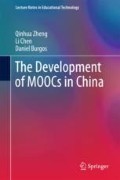Abstract
This chapter explores the potential impact of Massive Open Online Courses (MOOCs) on the international aspects of university development, claiming that the development and offering of MOOCs can affect not only universities’ educational offerings but also the way they plan their development within an increasingly globalized context. This chapter argues that MOOCs can contribute to enhancing universities’ international cooperation and propose six patterns of international cooperation among universities empowered by MOOCs.
Notes
- 1.
The results of this research are presented in www.wikieducator.org.
- 2.
See www.emundusatlas.org.
- 3.
While the research has been looking at open education approaches in general, the present paper focuses primarily on MOOCs.
- 4.
Such as Futurelearn in the UK, MiriadaX in Spain, and recently EduOpen in Italy.
References
Ardis, M. A., & Henderson, P. B. (2012). Software engineering education (SEEd): Is software engineering ready for MOOCs? ACM SIGSOFT Software Engineering Notes, 37(5), 14.
Becker, S., Cummins, M., Davis, A., Freeman, A., Hall Giesinger, C., & Ananthanarayanan, V. (2017). NMC horizon report: 2017 higher education edition. Austin, Texas: The New Media Consortium.
Bijnens, H., et al. (2006). European cooperation in education through Virtual Mobility—A best practices manual. Leuven: EUROPACE.
Billingsley, W., & Steel, J. R. (2014). Towards a supercollaborative software engineering MOOC. In Companion Proceedings of the 36th International Conference on Software Engineering (pp. 283–286). ACM.
Burgos, D. (2015a). OER y currículo. Colaboración sin servilismo. Retrieved September 18 2015 from http://research.unir.net http://research.unir.net/blog/oer-y-curriculo-colaboracion-sin-servilismo/?lang=es.
Burgos, D. (2015b). MOOCs y currículo. ¿Un equilibrio posible?. Retrieved September 18 2015 from http://research.unir.net http://research.unir.net/blog/cronica-desde-qingdao-3-moocs-y-curriculo-un-equilibrio-posible/?lang=es.
Class-Central. (2017). By the numbers: MOOCs in 2016. Retrieved May 31st 2017 from https://www.class-central.com/report/mooc-stats-2016/.
Commission, European. (2013). Communication on ‘Opening up Education: Innovative teaching and learning for all through new Technologies and Open Educational Resources. Luxembourg: European Commission.
Commission, European. (2017). Communication on a renewed EU agenda for higher education. Luxembourg: European Commission.
Fischer, L. (2014). Marketing of education. The Pie Review, 2013(3).
Garcia, F., Diaz, G., Tawfik, M., Martin, S., Sancristobal, E., & Castro, M. (2014). A practice-based MOOC for learning electronics. In Global Engineering Education Conference (EDUCON), 2014 IEEE (pp. 969–974). IEEE.
Grove, J. (2016). MOOCs: International credit transfer system edges closer. Times Higher Education, https://www.timeshighereducation.com/news/moocs-international-credit-transfer-system-edges-closer. Accessed April 24 2016.
Johnson, D. H. (2013). Teaching a “MOOC:” Experiences from the front line. In Digital Signal Processing and Signal Processing Education Meeting (DSP/SPE), 2013 IEEE (pp. 268–272). IEEE.
Knight, J. (2008). Higher education in turmoil: The changing world of internationalization. The Netherlands: Sense Publishers.
Knox, J. (2013, January–March). The limitations of access alone: Moving towards open processes in education technology. Open Praxis, 5(1), 21–29.
Lazetic, P, Souto-Otero, M., & Shields, R. (2015). OpenCases: Catalogue of mini cases on open education in Europe. Publications Office of the European Union.
Mackintosh, W., McGreal, R., & Taylor, J. (2011). Open Educational Resources (OER) for assessment and credit for students’ projects: Towards a logic model and plan for action. Retrieved from http://hdl.handle.net/2149/3039.
McGreal, R., Conrad, D., Murphy, A., Witthaus, G., & Mackintosh, W. (2014). Formalising informal learning: Assessment and accreditation challenges within disaggregated systems. Open Praxis, 6(2), 125–133.
Mulder, F., & Jansen, D. (2015). MOOCs for opening up education and the OpenupEd initiative. In C. J. Bonk, M. M. Lee, T. C. Reeves, & T. H. Reynolds (Eds.), The MOOCs and open education around the world. New York: Routledge Tayler & Francis Group.
Nascimbeni, F. (2014). The increased complexity of Higher Education collaboration in times of Open Education. Campus virtuales, 3(1), 102–108.
Pawlowski, J. M., et al. (2013). Open educational ideas: Early stage sharing of educational artefacts. EIF 2013. Barcelona, Spain.
Quiang, Z. (2003). Internationalization of higher education: Towards a conceptual framework. Policy Futures in Education, 1(2).
Richter, T. (2011). Adaptability as a special demand on open educational resources: The cultural context of e-Learning. European Journal of Open, Distance and E-Learning, 2.
Sutton, S. B. (2010, January–February). Transforming internationalization through partnerships. International Educator.
The Economist. (2017). Learning and earning: The return of the MOOC. Established education providers v new contenders. Retrieved June 2, 2017 from http://www.economist.com/news/special-report/21714173-alternative-providers-education-must-solve-problems-cost-and.
UNESCO. (2015). Qingdao declaration. In: International Conference on Ict and Post-2015 Education, May 23–25, 2015. Qingdao, The People’s Republic of China.
Weller, M. (2014). The battle for open. London: Ubiquity Press.
Westera, W., van den Herik, Jap, & van de Vrie, E. (2004). Strategic alliances in education: The knowledge engineering web. Innovations in Education and Teaching International, 41(3), 317–328.
Yuan, L., & Powell, S. (2013). MOOCs and open education: Implications for higher education. JISC CETIS.
Acknowledgements
This chapter has been authored by Daniel Burgos (Universidad Internacional de La Rioja – UNIR–), Fabio Nascimbeni (Universidad Internacional de La Rioja – UNIR–), and Edison Spina (Universidad de Sao Paulo – USP–). This book chapter is based on the results of the eMundus project, an action conducted during the period 2013-2015 with the support of the Erasmus Mundus programme of the European Commission. The project involved an international consortium composed by SOPHIA R&I (Italy), the Open University of the Netherlands (NL), the Universidad Internacional de la Rioja (UNIR, Spain), the University of Sao Paulo (Brazil), the Universidad Autonoma Metropolitana (Mexico), the Moscow State University of Economics, Statistics, and Informatics (Russia), the OER Foundation (New Zealand), Athabasca University (Canada) and the Universitas Siswa Bangsa Internasional (Indonesia).
Furthermore, this research is partially funded by Universidad Internacional de la Rioja (UNIR) (http://transfer.unir.net), through the Research Institute for Innovation & Technology in Education (UNIR iTED, http://ited.unir.net), UNESCO Chair on eLearning, ICDE Chair in Open Educational Resources (http://research.unir.net/unesco), and the Telefónica-UNIR Chair in Digital Society and Education.
Author information
Authors and Affiliations
Corresponding author
Rights and permissions
Copyright information
© 2018 Springer Nature Singapore Pte Ltd.
About this chapter
Cite this chapter
Zheng, Q., Chen, L., Burgos, D. (2018). The International Comparison and Trend Analysis of the Development of MOOCs in Higher Education. In: The Development of MOOCs in China. Lecture Notes in Educational Technology. Springer, Singapore. https://doi.org/10.1007/978-981-10-6586-6_1
Download citation
DOI: https://doi.org/10.1007/978-981-10-6586-6_1
Published:
Publisher Name: Springer, Singapore
Print ISBN: 978-981-10-6585-9
Online ISBN: 978-981-10-6586-6
eBook Packages: EducationEducation (R0)

